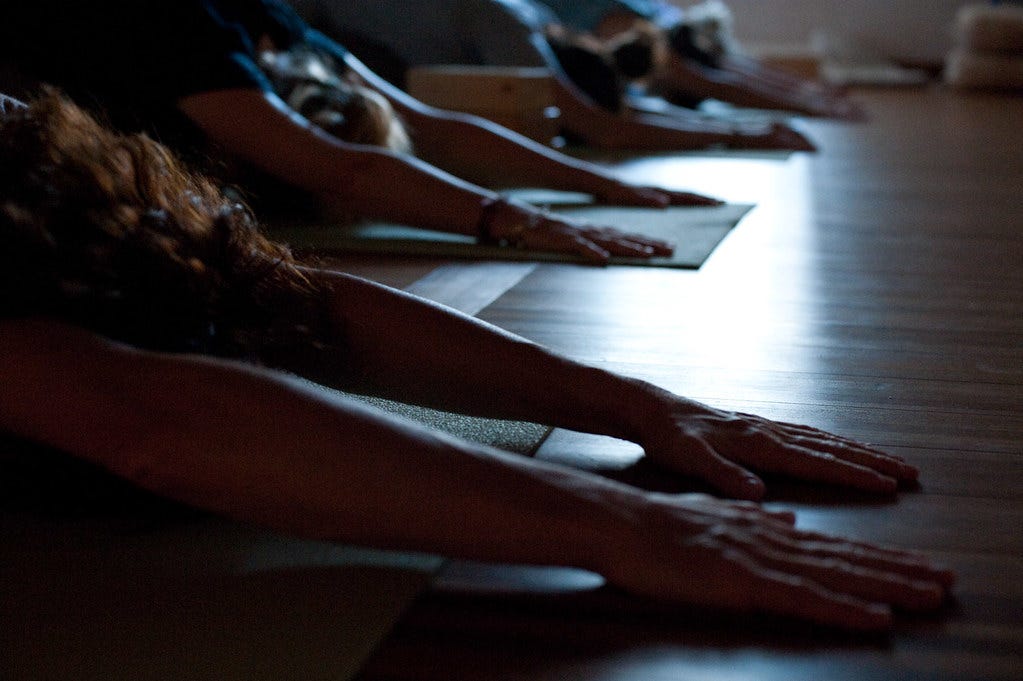Woo-hoo
Why esoteric exercise regimes can end up hurting your health
"Yoga class" by Mia Battaglia photography is licensed under CC BY-NC-ND 2.0.
I recently got my 500th free subscriber. Thanks to all of you for reading!
Members of the so-called Generation X, including me, experienced the split between the old analogue world and the new digital world in early adulthood in a very visceral way. In my case, I was born in 1970. My memories of childhood largely involve running around, climbing trees and swimming in rivers, lakes and the sea.
My degree (in philosophy) was based on books, paper and pens, although I did have to hand in a word-processed version of my hand-written dissertation*. I bought my first laptop when I was teaching English as a foreign language in Madrid after university and taught myself to touch-type as I was learning Spanish.
When I started a course in journalism, at 24, computers became much more important to my life. A large percentage of my subsequent career as a financial journalist has been spent sitting behind a computer screen.
In all honesty, this has always felt odd to me, given the lack of computers in my childhood. People who are older than me will have experienced the move to computers much later in their lives. Meanwhile, people who are much younger than me will have had greater exposure to computers in their childhood and education.
One of the ways I have coped with the need to spend much of my time sitting behind a computer screen is with a vigorous exercise regime in my own time. Exercise is, obviously, a healthy habit for anyone to develop. Why am I talking about this in a blog on thinking critically about the news?
Different exercise regimes will resonate with different people. Some will prefer formal competition, while others will prefer to compete against themselves. Some will prefer solitary practices, while others will prefer company. Some will look for extreme experiences, while others will prefer a gentle stroll. The options include everything from powerlifting to pottering around in an allotment.
Some people will prefer any sense of transcendence to mostly go unspoken. However, others will be drawn to wellness systems with an explicitly spiritual side, including activities which Astral Codex Ten rather unkindly describes as “woo.” These options include exercise regimes like tai chi, yoga and exposing yourself to extreme temperatures.
There is nothing wrong with doing any of these activities in themselves. Our ancestors would be much less puzzled by people getting up early to move gracefully in traditional ways, exploring different stretches and swimming in ice-cold rivers than they would by people sitting behind a computer screen for 40 hours a week.
The problems come when people talk about these activities. Tai chi practitioners might start talking about an alleged universal energy, while yoga teachers might discuss imaginary meridian lines within the body and people who endure extreme temperatures might be tempted to exaggerate the benefits of the practice. People who spend time in these movements can gain status by never questioning the esoteric groupthink that accompanies the activities.
There are risks here. Imagine an extremely negative person challenges the shaky foundations of a believer’s worldview with a little fact-checking. Expect extreme cognitive dissonance as a result. Conspiracy theories are then likely to be deployed as bodyguards for a failing worldview.
Once someone starts building conspiracy theories into their worldview, there will always be a temptation to add another one. A conspiratorial mindset can develop as a result, which can make true believers increasingly reluctant to accept the views of true experts and credible researchers.
Refusing to consider that you might be wrong can lead to strange results, including a reluctance to get vaccinated that can seriously damage your health or joining a bleach-drinking cult. The results will be the opposite of what a person was looking for before they began exploring an esoteric activity in the first place.
There are also risks in basing your identity on extreme exercise regimes with no woo whatsoever. A proposed cage fight between social media tycoons Mark Zuckerberg and Elon Musk is a clear example here. How did cage fighting become an acceptable way for geeks to work out their differences? We really are living in Joe Rogan’s world now. The comments are open. See you next week!
*Thanks for typing my dissertation up for me, Mum!
Further Reading
The strange tale of a yoga teacher who became a QAnon guru
Sharpen Your Axe is a project to develop a community who want to think critically about the media, conspiracy theories and current affairs without getting conned by gurus selling fringe views. Please subscribe to get this content in your inbox every week. Shares on social media are appreciated!
If this is the first post you have seen, I recommend starting with the second anniversary post. You can also find an ultra-cheap Kindle book here. If you want to read the book on your phone, tablet or computer, you can download the Kindle software for Android, Apple or Windows for free.
Opinions expressed on Substack, Twitter, Mastodon and Post are those of Rupert Cocke as an individual and do not reflect the opinions or views of the organization where he works or its subsidiaries.



Please do miracle diets next ;)